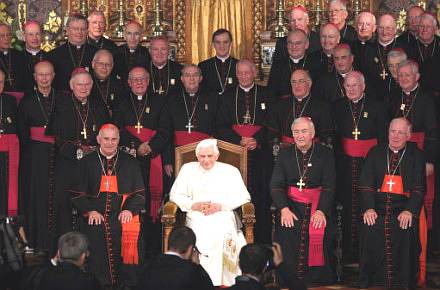 William Oddie likte svært godt det hyrdebrevet de engelske, katolske biskopene lot les i alle kirker nylig: «The most remarkable thing of all, perhaps, apart from the fact that it was from all the bishops, not just our own diocesan, was that it held the attention from beginning to end. It said something real: there wasn’t a platitude in it. It was short (some pastoral letters do drone on a bit) and it was very important indeed.»
William Oddie likte svært godt det hyrdebrevet de engelske, katolske biskopene lot les i alle kirker nylig: «The most remarkable thing of all, perhaps, apart from the fact that it was from all the bishops, not just our own diocesan, was that it held the attention from beginning to end. It said something real: there wasn’t a platitude in it. It was short (some pastoral letters do drone on a bit) and it was very important indeed.»
Brevet handlet mest om den nye engelske oversettelsen av messen – innføringen av denne over hele verden i løpet av neste halvår er virkelig en revolusjon. Oddie mener det er bemerkeslesverdig at biskopene innrømmer feilene ved den gamle oversettelsen så tydelig som de nå gjør:
… The bishops are saying that the “style of language and expression” of the Mass we now have doesn’t itself draw us into the transcendent and divine. That’s not to say that during Mass we aren’t so drawn: but that’s because, for all its failings, the Novus Ordo in English is still a valid Mass; we know that and so can be drawn into its reality, the reality that because of the celebration we are attending we will truly receive Christ’s Body and Precious Blood.
But the language that contains this reality has not been worthy of it. And there has been a very good reason for that: its intention was precisely not to draw us into the transcendent and the divine. Why? Because the underlying intention of the translators was deeply corrupted …
Oddie nevner også andre feil ved den tidligere oversettelsen:
… These texts, as Fr (now Mgr) Bruce Harbert put it, “repeatedly overestimate the value of human effort and undervalue the role of divine grace in human life, … (the) .. tendency in the old translation was in its inclination to remove any sign of humility before God. “Lord”, wherever possible was suppressed, often replaced by “Father”. Any note of supplication tended to be downplayed; all this, Mgr Harbert said – in an article for the Catholic Herald I asked him to write, years before work began on the new translation, as it turned out under his supervision (Deo Gratias!) – would have to be reversed. He gave as an example “the somewhat peremptory words ‘And so, Father, we bring you these gifts. We ask you to make them holy by the power of your spirit’.’” In the new translation this appears as “Therefore, O Lord, we humbly implore you: by the same Spirit graciously make holy these gifts we have brought to you for consecration”. The old immanentist cockiness has been extirpated; humility before a transcendent God has been restored.
